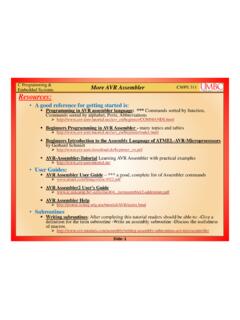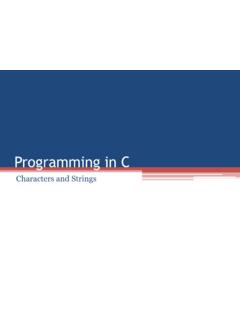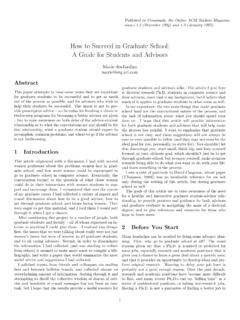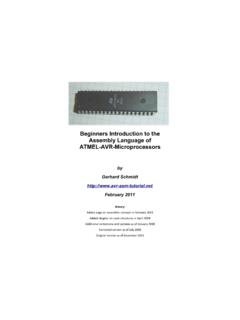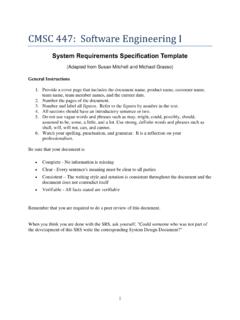Transcription of C Programming and Embedded Systems
1 Arrays Arrays, Argument Passing, Promotion, Demotion Review Introduction to C C History Compiling C Identifiers Variables Declaration, Definition, Initialization Variable Types Logical Operators Control Structures loops Functions and Macros Separate Compilation Arrays in C Array - a collective name given to a group of similar quantities All integers, floats, chars, Array of chars is called a string C Array A block of memory locations that can be accessed using the same variable name Same data type Declaration of Arrays Arrays must be declared before they may be used type variable_name[length]; Type the variable type of the element to be stored in the array Variable_name Any name of the variable to be addressed Length computer will reserve a contiguous block of memory space according to length of array in memory *program considers the block contiguous, though the architecture may place the array in multiple pages of memory* Examples double height[10]; Type: double Variable name: height Length: 1o float width[20]; int c[9]; char name[20].
2 Would be referred to as a string Array Implementation in C Array identifier alone is a variable storing the address of the first element of the array Typically dereferenced with offset to access various elements of the array for reading or modification First element of array is stored at position 0, second at position 1, nth at (n-1)th position Accessing variable a[n] = (n+1)th element Initialization Arrays should be initialized to some value Uninitialized arrays are still able to be accessed - can access garbage memory contents Example int a[] = {10,20,30,40}; int a[5]={1,2,3}; If array size > numbers initialized, all others initialized to zero int a[5] = {0}; Shorthand for initializing all elements to 0 Accessing Array Elements Accessed with a dereference and offset using the [] operator After dereferenced, treated like normal variables Can be read and modified like a normal variable Valid array access examples: c[0] = 3; c[3] += 5; y = c[x+1] ; Char Array Character arrays can be initialized using string literals String literals are specified with double quotes and are an array of constant characters and are terminated by null character A null character terminates c-style strings \0 null character Equivalent char arrays example: Char string1[] = first ; Char string1[] = { f , i , r , s , t , \0 }; Can access individual characters string1[3] == s scanf() Function for taking input from stdin Format: scanf( %s , string1).
3 Function Reads characters from stdin until whitespace encountered Can write beyond end of array More Char Array char string[5] = hello Error: 6 characters in string literal due to null character Char string[10] = hello Equivalent to hello\0\0\0\0\0 Note: string= hello will give a syntax error Example Program #include < > int main(){ char string1[20], string2[]= string ; int I; printf( Enter a string: ); scanf( %s , string1); printf( string1 is: %s\nstring2 is: %s\n ,string1, string2); for(i=0;string1[i]!= \0 ;i++) printf( %c ,string1[i]); printf( \n ); return 0; } Printing strings using printf Getting input using scanf Printing by iterating through char array Multidimensional Arrays Multidimensional Array initialization: Unspecified elements in given row initialized to 0 Rows not given initialized to 0 Ex int a[3][2] = {{1},{3,4}}; Result shown on right Passing Arrays to Functions To pass an array argument to a function specify the name of the array without any brackets myFunction(myArrayName); Arrays are treated as pass by reference The memory address for the array is copied and passed by value Name of array is the address of the first element Knows where the array is stored in memory Modifies original memory locations Passing Array Elements Array elements are passed by value Original memory location is not modified Ex.
4 MyFunction(myArray[3]); myArray is not modified by this function Protecting Array Elements const modifier will help protect contents of constant-elements by generating compiler messages Example message warning: passing argument 1 of myFunction discards qualifiers from pointer target type note: expected char * but argument is of type const char * Message is generated regardless of whether array is modified Function with Const Array int AccessElement(const int a[], int index); Coding rule: always provide const modifier in parameter types where appropriate even though it is optional Prevents creating bugs This function would not generate a warning when called Does generate an error if attempt to modify the array Implicit Type Casting float f1 = 0; f2 = 1; int i1 = 0; i2 = 2; char c1 = 1; c2 = 2; f1 = i1/i2; Int by int division, the result is cast to become a float so F0 becomes ; Explicit Type Casting To avoid implicit type casting compiler warnings and errors use unary cast operator Unary cast operator - (type) Example: F1 = (float)i1/(float)i2; Demotion Shortening integral types assigning int to char, long to int, Bit truncation occurs, or undefined if value cannot be stored in lower rank type Float to int casting attempts to truncate (remove) fractional part NOT ROUNDING int i = ; sets i to 1, even if i = ; Unsigned to signed casting is particularly dangerous unsigned int j = -1; //gives a very large positive number Implicit Type Casting Functions int mult(int a, int b){ Return (a*b); } /* somewhere in main*/ float f0,f1,f2; f0 = mult(f1, f2).
5 Parameter passing is like assignments, implicit casting can occur and will cause warnings f0 = (float)mult( (int)f1 , (int)f2 ); Better to use implicit type casting
